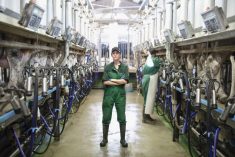Glacier FarmMedia — In the past decade, Canadian consumers have largely been indifferent or optimistic about the domestic food system, but that’s no longer the case.
The Canadian food system’s reputation has taken a significant hit in the last couple years, said Ashely Bruner of the Canadian Centre for Food Integrity (CCFI) during a recent webinar.
“For the first time in seven years, Canadians are quite polarized on whether the country’s food system is headed in the right or wrong direction,” said Bruner, CCFI’s director of research and stakeholder engagement.
Read Also

Canada’s Loblaw raises annual profit forecast on resilient grocery demand
Loblaw raised its annual profit forecast after beating third-quarter profit estimates on Wednesday, as the Canadian retailer bet on demand for grocery and medicines at its discount stores to remain resilient amid economic uncertainties.
The CCFI has conducted research every year since 2017 on the topic of public trust in the Canadian food system, and according to the 2024 data, the most recent available, only three in 10 Canadians believe the food system is on the right track.
“This is a tracking low for us,” Bruner said.
Fewer than half have positive view
The 2024 survey also showed that fewer than half of Canadians (45 per cent) have a positive view of the food system, reflecting a sharp decrease from previous years, and that 18 per cent of Canadian consumers had a “negative” impression of the food system, an increase from 11 per cent the previous year.
“Earlier waves of research found that Canadians were largely indifferent to the food system, and a fair amount do remain as such, but we are losing ground on that mushy middle to pessimism and polarization,” Bruner said.
According to CCFI data, perceptions of the food system peaked in 2020, when nearly half of Canadians felt the food system was headed in the right direction, a number that reflects what Bruner calls a “COVID boost.”
“In nearly all of our tracking metrics, Canada’s food system was seen as doing very well in continuing to provide reliable and safe food for Canadians,” she said of the 2020 data.
“Grocery store workers were literally heroes. We were banging pots and pans outside every night. Everyone learned to make bread. We were told we were all in this together. People were engaged … and that engagement translated into improved perceptions.”
Bruner says the reason for the decline now is likely due to growing levels of pessimism in general, which is not unique to Canada or the food sector.
Trust in institutions declining
Public trust in Canadian sectors and institutions, such as the agriculture industry, federal and provincial institutions and mainstream media, is also on the decline, according to the CCFI data.
Furthermore, Bruner believes that farmers, along with other professional groups such as scientists and researchers, are losing their audiences to flashier and more accessible social media influencers, and that this needs to be addressed through collective action from the sector.
Some experts, however, question just how much value the sector should place in public trust.
John Gormley, a former broadcaster and MP with decades of experience shaping and analyzing public opinion in Saskatchewan, believes the agriculture industry should be critical of the issue of public trust as it relates to social license.
“I have real concerns about social license,” said Gormley, who currently practices law in Saskatoon.
“I think social license often confuses public education and public acceptance with a sense of permission. And I start from the point that nobody needs anybody else’s license, approval, consent, permission to carry on an already legal and regulated activity.”
He says that farming practices are already heavily regulated in Canada and shouldn’t be constrained by opinions of people who do not understand the industry and/or who are involved with special interest groups.
Farmers still largely trusted
However, Gormley does believe that there is potential for the sector to capitalize on the inherent trust that the public has in farmers.
“Overwhelmingly, people regard farmers as being on the same page as they are. They’re trustworthy human beings, they adhere to science, they adhere to best practices. They’re ethical people who don’t want to cause harm … and those are some of the strongest hallmarks of trust, the sense of empathy and identity.”
“Could you take those individual trust metrics and to amplify them to a larger audience? That doesn’t hurt. There are lots of people in the larger audience who haven’t applied their mind to it. Maybe they don’t have that kind of affinity or exposure to a farmer. So, I don’t think that’s a bad thing.”
Bruner also believes there are opportunities to capitalize on public trust in farmers. Although those trust levels have declined recently, they still remain higher than, or on par with, that of other professions, she says.
“Farmers are historically and always the most trusted, but the alarming decrease in trust toward this group means they’re now tied with scientists, and university researchers are close behind.”
She also believes there are various other data-supported ways to engage the general public, including by sharing information through trusted sources and influencers, disseminating information to make it more emotionally resonant and cultivating media and science literacy.
Data also shows there are many aspects of the food system that could form emotional touch points with the general public, Bruner said, including in terms of the diversity of jobs available in the sector and collective efforts to grow sustainability efforts.
“As we move into this year, it’s clear that things need to be done differently,” she said.
“Canadians are paying attention more than ever, which is a great opportunity to tell our story.”














